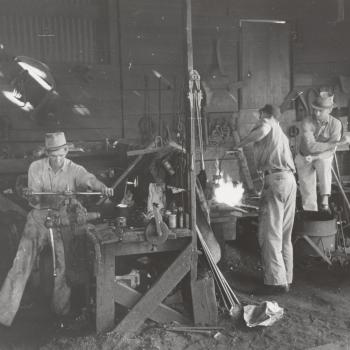The Working Catholic: Culture Despisers by Bill Droel
Cardinal Francis George, OMI (1937-2015) of Chicago was a conservative who often bemoaned the defects in our society. Yet George insisted that people must love their society before they can improve it. Negativity ends in futile resentment, sometimes accompanied by violence.
Those who despise can be found in marginal groups, including some with a religious appeal. In the Catholic Church, for example, some people are counting on the collapse of the institution. “It needs to go out of business,” say these disgruntled Catholics. Their number, by the way, includes some clergy and other church employees.
Those on the right favor a schism. The seminaries, chanceries and rectories are dens of self-perpetuating decadence, they assert. Society contains little spiritual nourishment. Some on the Catholic right believe that public schools are too secular and Catholic schools are too liberal. Thus they promote home-schooling. They mistakenly call their sectarian alternative “the Benedict Option.”
To those on the left who despise, the Catholic enterprise is dysfunctional, morally bankrupt and irredeemable. It is a waste to invest any energy in Catholicism while its office holders answer questions that no one is asking, while they issue confounding corrections on sacramental procedure and retain trappings of royalty. These progressives are quick to call out their pastor’s latest foible. Their church attendance is spotty; some drift in and out of off-site worship venues.
Parker Richards, writing in The New Republic (4/22), finds people on the right and left who think our social structures are irreversibly bad. Ours is “a uniquely, awful, sinful country,” these types say. Our society cannot be renewed. It must be replaced.
Richards is a realist. We must own up to the worst in our history and our current affairs—to slavery, misogyny, disregard for the sanctity of each life, elitism, the exploitation of young women and children as portrayed on the internet, corruption in government, greed in business and more. But we cannot abandon the pursuit of a more perfect union and better institutions, even while aware that utopia is impossible. The pursuit “is worthy in itself,” Richards says. “It is the duty of citizens to strive to better their country, no matter which set of ideals they happen to espouse.” By contrast, those who despise often adopt a “detached spectatorship,” Richards continues. Their attitude “allows [for] complacency and lack of interest in our own future, or worse, it builds upon the impulse to tear down, to rend and to gut for its own sake.”
Most of the disaffected would never trash the halls of Congress. But they fool themselves. They readily voice their opinions at family gatherings or in the barber shop. They appear at a rally on occasion. But in truth these well-meaning people are “political hobbyists,” says Eitan Hersh in Politics Is for Power (Scribner, 2020). “They learn about and talk about big important things. [However,] their style of politics is a parlor game in which they debate the issues on their abstract merits.” They fail to steadily go deep enough into institutions to make practical reforms. Because they cannot imagine incremental progress, they unwittingly lose their own agency.
A realistic, responsible Catholic is proud of our faith tradition while acknowledging that today’s and tomorrow’s church is corrupt, rife with hypocrisy and impeded by some clueless leaders. A realistic, responsible citizen is likewise proud of our country while acknowledging structures of racism, vacuous celebrity culture, greedy technology executives, phony politicians and deliberate denial of fundamental rights.
So we give three cheers for the long-haul realists who simultaneously imagine a better future and realize that perfection is unattainable this side of heaven. Let’s pause and acknowledge the executive and her team who patiently coax green proposals through their company’s bureaucracy; those minimum wage workers who organize at one and then another of the nationally-based coffee shops; those parishioners who, not waiting for cues from the rectory, establish relationships with members of a mosque to assist with a program for the homeless and those clubs at a Catholic high school that send supplies to Ukrainian refugees and all those engaged in the never-ending task of improving church and society..
Droel edits INITIATIVES (POB 291102, Chicago, IL 60629), a newsletter on faith and work.










